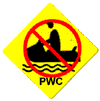 |
Can Some Answers Be Found in Prior Recreational Conflict Research? A Pilot Paper |
 |
 |
Can Some Answers Be Found in Prior Recreational Conflict Research? A Pilot Paper |
 |
by Gary Polson Polson Enterprises RBBI Recreational Boat Building Industry Home Page www.rbbi.com originally published 2 February 1998 Copyright © 1998 by Polson Enterprises all rights reserved Note: the animated PWC sign above and its components are also Copyright © 1998 by Polson Enterprises all rights reserved.

 Preamble
Preamble

Preamble
If you will read the research papers discussed by this paper, you will see that most conflicts of this nature are "one way" in that one group feels the other group prevents them from having a complete recreational experience. This is how the conflict begins. "One way" does not mean there are not PWC users out there who despise boaters (and maybe for good reasons), it means statistically a lot more boaters are upset with PWC operators than there are PWC operators upset with boaters.
This article defines boats as traditional boats (not including PWCs). The article also defines boaters as those operating traditional boats. That does not mean PWCs are not boats and PWC operators are not boaters. It is just the terminology used by this article.
This article presents numerous "evil" things about PWCs and very few about boats. It also does not recognize that PWC manufacturers and PWC operators have done many good things to address some issues raised in the conflict. Some boaters still feel PWCs infringe on them having the recreational experience they desire. The conflict begins right there. Boating may be dangerous, some boaters may be idiots, issues raised by boaters may be "one sided bitches", PWCs and PWC operators have addressed some of the issues, but all of this is immaterial. If the remaining major issues raised by boaters are not addressed the conflict will not be resolved. No conflict has ever been peacefully resolved without addressing the issues. This is a one sided conflict so the issues raised by the boaters must be addressed. Note that addressing the issues does not mean "giving in to them", it may mean educating boaters in why things are like they are, or in alternative ways they can still have a complete recreational experience. If this approach makes the article, biased, then so be it.
I am biased, in that I hope the conflict will be resolved and those who enjoy riding PWCs will be able to continue to enjoy their activity to the fullest extent possible, that is why I wrote this paper.

Introduction
If have any comments about this paper, please email us.

Review of Boaters vs. PWCs Recreational Conflict
 This section is where I started to get "in trouble" with the pro-PWC crowd. I thought it necessary to "review" the conflict, especially for any that might not be familiar with it. Everything I said, hit a "nerve." About 10 days after posting this article, an excellent, well done, professional review of the conflict written by Gary Beckett was published in Soundings Trade Only (Feb 98 page 69). I encourage everyone to read that article, skip this "Review" section and then read the rest of my paper.
This section is where I started to get "in trouble" with the pro-PWC crowd. I thought it necessary to "review" the conflict, especially for any that might not be familiar with it. Everything I said, hit a "nerve." About 10 days after posting this article, an excellent, well done, professional review of the conflict written by Gary Beckett was published in Soundings Trade Only (Feb 98 page 69). I encourage everyone to read that article, skip this "Review" section and then read the rest of my paper.
For those not familiar with the Boaters vs. PWCs RC we will present a brief overview of the situation. In recent years, PWC's (personal water craft also know as jet skis) have become very popular. They are built by companies in the ATV and snowmobile business, not by companies traditionally in the boat building business. The boating industry has reached maturity and growth has been very difficult to achieve. Some boat manufacturers see PWC manufacturers as stealing their customers. Others argue that additional people are being brought to the water who may later "move up" to boats. Still others point out that many existing boaters are purchasing PWC's instead of upgrading to a bigger or better boat.
Recently, Iwin Jacobs of Genmar, withdrew his company from the NMMA (National Marine Manufacturer's Association) in protest to their allowing PWC manufacturers in the organization.
Boaters complain about the lifestyle and conduct of PWC operators, likening them to "hells angels." PWC users are typically younger, noisier, and rowdier than boaters. They often "jump the wake" closely behind boats over the objection of boaters and good safety practices. A major objection to PWCs is the noise disturbs the tranquility of the outdoors.
"On water" accident statistics have soared with the popularity of PWCs. The 27 August 1997 issue of the American Medical Association Journal reported a study done by the Center for Disease Control and Prevention on PWC injuries. Portions of that study and other PWC accident information are available on our PWC Accident Study Page. Some boat companies fear this unsafe image will "rub off" onto boating as a whole.
In some locations, PWCs add to already overcrowding.
Frequently voiced objections to PWCs include:

Some references describing the current "State of the Conflict" are:

Return to Recreational Boat Building Industry Home Page